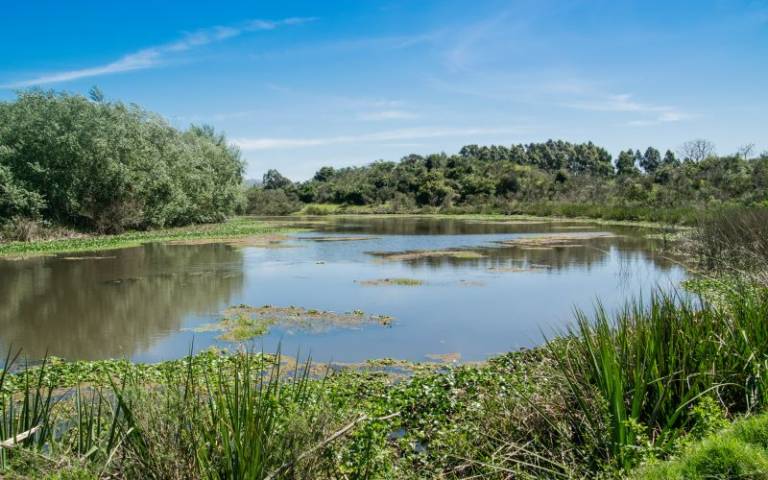Pollinating insects such as bees, butterflies, hoverflies and wasps, interact more with plants at well-managed farmland ponds than those that are severely overgrown by trees, finds a new study led by UCL researchers.

The study, published in Agriculture, Ecosystems and Environment, has been undertaken by the UCL Pond Restoration Group; since 2014 the research team has been working with the Norfolk Ponds Project, helping put pond restoration into practice, with the aim of showing how conservation and farming can work together.
Explaining the study, lead author PhD researcher Richard Walton (UCL Geography) said: "For several decades, a great deal of effort has gone into habitat creation or protection on UK farmland, to try and halt the dramatic declines in pollinating insects.
"At the same time, many farm ponds have been in-filled to create more agricultural land, and many remaining ponds have suffered poor ecological health with overgrown trees and shrubs making them dark and inhospitable - leading to declines in species diversity.
"However proposed management of pond habitats through restoration has not previously focused on pollinators. We therefore studied the impacts of tree/shrub management at farmland ponds on plant-pollinator interactions to determine the benefits of restoration for pollinators in UK farmland. "
For this study, researchers carried out assessments at nine ponds in North Norfolk; three were 'long-term managed ponds', subjected to light-to-moderate removal of woody vegetation about once or twice every decade over the last 40 years; three were 'recently restored ponds' with major removal of woody vegetation and sediment; and three were 'overgrown' ponds', shrub and tree dominated resulting from at least 30-40 years of abandonment.
Summary of findings
Plant-pollinator interactions were shown to be most complex at ponds that had either been restored from a fully-overgrown state or were long-term managed with some occasional tree and shrub removal each decade over a 40-year period compared to those that were overgrown and had no management strategy.
The number of pollinating insect species and the number of plant species they interacted with was highest at the long-term managed and restored ponds, leading to a greater number of interactions between plants and pollinators at these sites.
High reward plants, such as water mint (Mentha aquatica), were also available at long-term managed and restored ponds but not at ponds that had been left overgrown with trees and shrubs, drawing in many different species of pollinating insects.
Meanwhile, further analysis of plant-pollinator interactions showed that ponds receiving occasional tree and shrub management or being restored from an overgrown state had plant-pollinator networks that were more stable, making them more resilient to natural or human-made disturbances.
Researchers hope these findings will allow landowners and conservationists to make more informed decisions on how to manage pond habitats, whilst also protecting and promoting pollinators.
Lead author, Richard Walton, said: "Previous research on farmland pond management and restoration done through the Norfolk Ponds Project and other pond research led by UCL has shown great benefits for aquatic wildlife.
"It's very exciting to see with this study how the management and restoration of ponds reaches beyond the watery realms and has massive benefits to our pollinating insects.
"Our research shows that pond habitats can be incredible food resources for struggling pollinator populations. With careful management of the trees and shrubs growing around farmland ponds, the number of different plants available to pollinating insects significantly increases and we see the pollinators make use of those improved resources.
"This research shows that pond management and restoration doesn't just improve the diversity of plants or pollinators, it greatly improves the interactions between them, and helps to stabilise and preserve those ecological connections which are so crucial to a functioning countryside.
"And ultimately, this can benefit us - as healthy plant-pollinator relationships can eventually lead to ecosystem services such as crop pollination, let alone the simple joy one can get from watching an insect visit and feed on a wild-flower."
Co-author, Professor Carl Sayer (UCL Geography), said: "This research proves the point that restoring old overgrown ponds, as we have been doing via the Norfolk Ponds Project, is great for all sorts of wildlife including the pollinators that we so need to conserve in our ever-pressured farmlands.
"On a warm day in late summer, good ponds literally buzz and there can be no doubt that they are oases for all sorts of insects."
Since 2014 the UCL Pond Restoration Group, working with the Norfolk Ponds Project has helped restore over 250 ponds in Norfolk.






